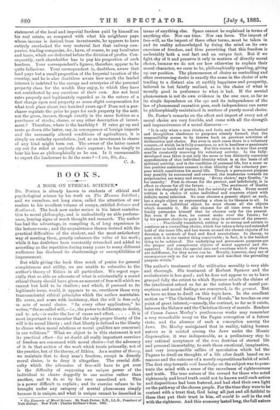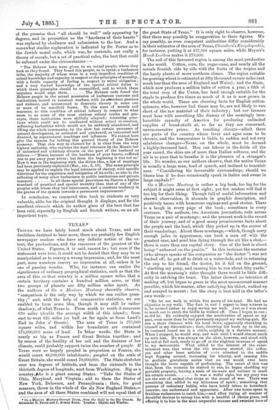BOOKS.
A BOOK ON ETHICAL SCIENCE.*
DR. PORTER is already known- to students of ethical and psychological science by his work on The Human Intellect ; and we ourselves, not long since, called the attention of our readers to his excellent volume of essays, entitled Science and Sentiment. The book now under review is his latest contribu- tion to moral philosophy, and is undoubtedly an able perform- ance, bearing signs of much thought and research. The author has had the advantage, in compiling it, of long experience in the lecture-room ; and the acquaintance thence derived with the practical difficulties of the student, and the most satisfactory way of meeting them, greatly enhances the value of his work ; while it has doubtless been constantly retouched and added to according as the repetition during many years to many different audiences has disclosed its shortcomings or susceptibilities of improvement.
But while giving the book thus much of praise for general completeness and utility, we are unable to subscribe to the author's theory of Ethics in all particulars. We regret espe- cially that so able an advocate of what is substantially a sound ethical theory should have given an account of free-will which we cannot but hold to be shallow ; and which, if pursued to its legitimate issue, would, it appears to us, overthrow those very transcendental ethical principles which the author maintains. He avers, and avers with insistency, that the will is• free only in acts of moral choice. " In every other application," he writes," the so-called will,—i.e., the power to deliberate, to desire, and to act,—is under the law of cause and effect.. . . . . It is most important to remember that the only proper liberty of the will is its moral liberty ; and that liberty is defined as the liberty to choose when moral relations or moral qualities are concerned in our volitions." What we object to in this statement is not its practical effect—for no doubt all really important exercises of freedom are concerned with moral choice—but the advocacy of it in that section of the work which treats primarily, not of the practice, but of the theory, of Ethics. As a matter of theory, we maintain that to deny man's freedom, except in directly moral choice, is to deny it altogether. The crucial diffi- culty which the advocates of free-will have to get over is the difficulty of supposing an unique power of the individual to cleave doggedly to one motive rather than another, and to do so by his own unmotived act. This is a power difficult to explain ; and its exercise refuses to be brought under any category of mental phenomena simply because it is unique, and what is unique cannot be described in • The Elements of Moral Science. By Noah Porter, D.D., LL.D., President of Yale College. New York : Charles Scribner's Sons. 1885.
terms of anything else. Space cannot be explained in terms of anything else. Nor can time. Nor can force. The import of free-will, as the import of these other terms, must be taken in and its reality acknowledged by fixing the mind on its own exercises of freedom, and thus perceiving that this freedom is undeniably both a real fact and an unique fact. But if we fight shy of it and preserve it only in matters of directly moral choice, because we do not see how otherwise to explain their moral character, we seem to be, philosophically speaking, giving up our position. The phenomenon of choice as controlling and often overcoming desire is exactly the same in the choice of acts tending to a distant aim at earthly happiness and prosperity, believed in but faintly realised, as in the choice of what is morally good in preference to what is bad. If the mental' phenomenon is not its own evidence in the one case, so far as its single dependence on the ego and its independence of the law of phenomenal causation goes, such independence can never be philosophically maintained in matters of purely moral choice.
Dr. Porter's remarks on the effect and import of every act of moral choice are very forcible, and come with all the strength and impressiveness of a moral discourse :—
" It is only when a man thinks, and feels, and acts in mechanical and thoughtless obedience to purposes already formed, that the responsibility seems to be thrown back on previous activities of deliberation and choice. But even in such cases there is a voluntary consent, of which be is fully conscious, to act in heedless or passionate obedience to habit and impulse. For this reason it is true that every man'lis constantly renewing his voluntary activity. In the fully- developed man there is not only the more or less distinctly conscious apprehension of that individual identity which is at the basis of all spiritual activity, and is the condition of personal life, but a more or less positive conscious consent to that identity of the voluntary pur- pose which constitutes his moral life. Though a permanent purpose may possibly be renounced and reversed, the tendencies towards its perpetuation are many and strong. Every choice,' says Goethe, is for eternity.' First to choose for the present, and indefinitely, is in
effect to choose for all the future The sentiment of Goethe is not the rhapsody of poetry, but the sobriety of fact. Every moral volition is a choice of some individual and concrete object with definite moral relations. No man chooses a generic object as such, but a single object as representing a class in its likeness to all. In choosing an individual object he must choose all the objects which resemble it. He also chooses for all time even when he fondly persuades himself that he chooses only for the present. But even if be does, he cannot make over the future ; for by his present choice he puts it one step in advance of the present_
Practically considered, nothing is so strong and certain to continue as a controlling choice, which has taken a deep and extended hold of the inner life, and has woven around the chosen objects of its devotion a network of fond and fixed associations. In theory, to part with it is the easiest thing conceivable ; in fact, it is the hardest thing to be achieved. The underlying and permanent purposes are the proper and conspicuous objects of moral approval and dis- approval. Not that the special acts and emotions which obey them are indifferent, for they never can be. Morally, however, they are of consequence only so far as they renew and manifest the prevailing purpose within."
The author's treatment of the utilitarian morality is very able and thorough. His treatment of Herbert Spencer and the evolutionists is less good ; and he does not appear to us to have grasped fully the extent to which Spencer admits the claims of the intuitionist school so far, as the nature both of moral per-
ceptions and moral feelings are concerned, in the present. But we have no time to dwell on this topic here. In the excellent section on " The Christian Theory of Morals," he touches on one point of great interest,—namely, the contrast, so far as it exists, between the Hebrew and the Christian theory of morals. Readers of Canon James Mozley's posthumous works may remember a very remarkable essay on the Pagan conception of a fixture state, and the absence of such a conception among the Jews. Dr. Mozley maintained that in reality, taking human nature as it existed among the Jews under the Mosaic dispensation, it was indispensable, as a preliminary step to
any rational acceptance of the true doctrine of eternal life and personal immortality, to curb those emotional, imaginative, and very irresponsible sallies of speculation which led the Pagans to dwell on thoughts of a life after death based on no reasons and the outcome of a merely superstitious habit of mind.
The first step towards real knowledge on the subject was to pene- trate the mind with a sense of the sacredness of righteousness and truth. The true nature of the reward for those who acted righteously and loved truth could not be known until such action and dispositions had been fostered, and had shed their own light on the pathway of the chosen people. For the time they were to be content with a trust that, God being all-just and all-faithful to them that put their trust in him, all would be well in the end with the righteous. And this economy lasted long, the full nature of the promise that "all should be well" only appearing by degrees, and in proportion as the "hardness of their hearts" was replaced by obedience and submission to the law. And a somewhat similar explanation is indicated by Dr. Porter as to the Jewish moral code, which was, he contends, not really a theory of morals, but a set of practical rules, the best that could be enforced under the circumstances :-
" The Hebrew laws were given to an actual people, whom they took as they found. They found this people, so to speak, a barbarous tribe, the majority of whom were in a very imperfect condition of actual knowledge and capacity, in respect to the principles of morality, with a feeble capacity of feeling in respect to moral obligation ; and a very limited knowledge of the special ethical duties in which these principles should be exemplified, and to which these
impulses would urge them The Hebrew code found the Hebrew people in the actual possession of barbarous customs and institutions, inured to constant warfare, with its atstrendant passions and violence, and accustomed to domestic slavery in some one or more of its manifold forms. To this state of morals and manners, to this condition of ethical infancy in respect to what seem to us some of the most obvious ethical truths and pre- cepts, these institutions were skilfully adapted ; tolerating prac- tices which could not be eradicated 'without actual re-creation, softening barbarities which would not be suddenly abandoned, and lifting the whole community, by the slow but certain processes of natural development, as animated and quickened, as instructed and directed, by supernatural teachings and influence. We cannot here give the reasons for bolding this general theory of the Hebrew economy. That this may be claimed for it is clear from the very highest authority, who explains the legal tolerance by the Mosaic law of unlimited and arbitrary divorce on the part of the husband as follows Moses, because of the hardness of your hearts, suffered you to put away your wives ; but from the beginning it was not so.' How it was in the beginning with the divine idea, a law of marriage had been previously explained (Mat., xix., 5, 19). The same principle may be applied to explain the legal tolerance of slavery, with specific directions for the regulation and mitigation of its evils; as also to the softening of many other barbarisms in public institutions and private manners In all these special provisions we discern a higher standard of practical and special morality than that of any of the peoples with whom they had intercourse, and a constant tendency in the genius of the system towards a permanent improvement."
In conclusion, we commend this book to students as very valuable, alike for the original thought it displays, and for the excellent résumés which its author gives of the best that has been said, especially by English and Scotch writers, on an all- important topic.



































 Previous page
Previous page